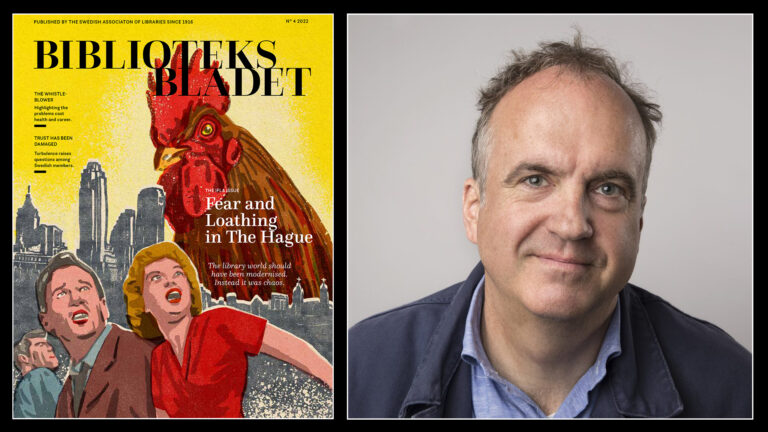Empty words about freedom of speech – many expect more from Ifla
24 nov 2022 • 2 min
EDITORIAL The removal of a leading person will hardly be enough. It will probably take significantly more if IFLA is to recover.

Biblioteksbladet number 4, 2022 and editor-in-chief Thord Eriksson.
In April, IFLA’s Governing Board announced that Secretary General Gerald Leitner had been relieved from his duties. This was at a time when an email from a Board member was circulating, testifying to a toxic atmosphere at the Federation’s headquarters in The Hague, and that independent investigations into the staff’s situation had been carried out. One member of the Board demanded the resignation of the Chair.
What was really going on?
For any journalist, it would have been a mistake not to ask questions.
It has taken a great deal of effort to get any answers at all.
One of IFLA’s core values is based on Article 19 of the UN Universal Declaration of Human Rights:
Everyone has the right to freedom of opinion and expression. This right includes freedom to hold opinions without repercussions, and seek, receive and disseminate information and ideas with the help of all means of expression and regardless of boundaries.
It should be easy to have a dialogue with an organisation that has these words ingrained in its identity. But since Biblioteksbladet published the first article on the turbulence within IFLA, the support for Article 19 has in practice turned out to be nothing but empty words.
They are just superficial sentences to which leading IFLA representatives seem to relate with alarming flexibility.
The representatives have refrained from answering questions. Instead of dispelling ambiguities, attempts have
been made to have the Swedish Library Association’s Secretary General Karin Linder intervene and stop articles from being published in Biblioteksbladet, which the Association owns.
”If I don’t do it, the sender is threatening to hire a lawyer,” she wrote in her opinion piece in this issue.
Many people expect more from the world’s leading library organisation.
If the principle of freedom of opinion and expression were taken seriously, current and former IFLA employees would not fear reprisals and not shy away from recounting what they have experienced at work.
The owner of an editorially independent newspaper would not face threats of legal action.
Also, the leadership and Board of the Federation would answer justified questions.
This issue of the Biblioteksbladet is devoted to the situation within IFLA. The image of a dysfunctional organisation, in which the removal of a leading person will hardly be enough, comes to the fore.
It will probably take significantly more if IFLA is to recover.
Translation: Catherine Middleton
Senaste nytt

På nätets skuggsida är vetenskapen öppen på riktigt
Alltmer vetenskap är fritt tillgänglig. Det beror inte bara på utvecklingen mot öppen tillgång, utan också på olagliga skuggbibliotek som erbjuder gratis vetenskap. Drivkraften är att sprida det man anser tillhör allmänheten.
18 apr 2024 • 4 min

Stabil ekonomi med förlust – men nu kapas kostnaderna
Oroliga tider – men Svensk biblioteksförenings ekonomi är ändå stabil, visar årsredovisningen för 2023. ”Nu ser vi över kostnaderna brett”, säger ordförande Helene Öberg.
17 apr 2024 • < 1 min

Nya namn föreslås till styrelsen
När ny styrelse ska väljas i Svensk biblioteksförening står två nya namn på valberedningens lista. Och ordförande Helene Öberg föreslås väljas om för ytterligare en tvåårsperiod.
17 apr 2024 • 2 min
Oro för bristande engagemang i föreningen
Endast två motioner har lämnats in inför Svensk biblioteksförenings årsmöte. Något som skulle kunna tyda på ett svagt engagemang. Dessutom handlar motionerna om, ja precis, bristande engagemang i föreningen.
16 apr 2024 • 2 min

”Folkbiblioteken är kärnan i delningsekonomin”
Vilken roll kan folkbiblioteken spela i delningsekonomin? Väldigt stor, svarar forskare som i studien Upscale följt danska och norska bibliotek strävan för ökad hållbarhet.
15 apr 2024 • 4 min

Inträdet i Nato får deras uppdrag att växa
Sveriges medlemskap i Nato innebär mycket nytt för Sjöstridsskolans bibliotek där två av Försvarsmaktens tre bibliotekarier jobbar. Ny information ska hanteras, nya arbetsuppgifter väntar, ny kompetens behövs.
12 apr 2024 • 3 min

Edholm om skolbiblioteken: "Man måste börja nånstans"
Det är upp till lärosätena att åtgärda bristen på skolbibliotekarier. Det är ett besked från skolminister Lotta Edholm när hon besöker Bibliotekshögskolan i Borås. "Det är klart att unga människor får upp ögonen för yrket. Och när söktrycket ökar är det naturligt att utöka antalet platser."
11 apr 2024 • 5 min

Kulturen viktig för hälsan – men bibliotekens roll oklar
Kulturens betydelse för hälsan har bekräftats i många studier. Men effekten av läsande och skrivande är mindre beforskat. Och forskning om bibliotekens betydelse för folkhälsan saknas.
10 apr 2024 • 2 min

Hon vill knyta ihop Europas bibliotek
Axiells nya vd Maria Wasing har stora tankar om tillväxt och bolaget betydelse. Men fler bibliotek än de i Nacka räknar hon inte med att företaget kommer att driva. ”Inte strategiskt viktigt för oss.”
9 apr 2024 • 6 min

Böckerna som censureras mest
Försöken att få bort böcker som handlar om sex, hbqi-frågor eller rasism eskalerar i USA. Här är de tio böcker som ansågs farligast 2023 och som plockades bort mest från bibliotekshyllorna.
8 apr 2024 • < 1 min

Ministerns besked om e-plikten – ”Ett fattigt svar”
För tre år sedan föreslog en utredning uppgraderad pliktlagstiftning för att det digitala kulturarvet inte ska gå förlorat Vad händer? Utbildningsminister Mats Persson gav svar tidigare i veckan.
5 apr 2024 • 2 min

USA:s biblioteksförening mål i kulturkriget
Attackerna mot biblioteken trappas upp i USA. Ett nytt lagförslag förbjuder medlemskap i den amerikanska biblioteksföreningen.
5 apr 2024 • 2 min







0 kommentarer